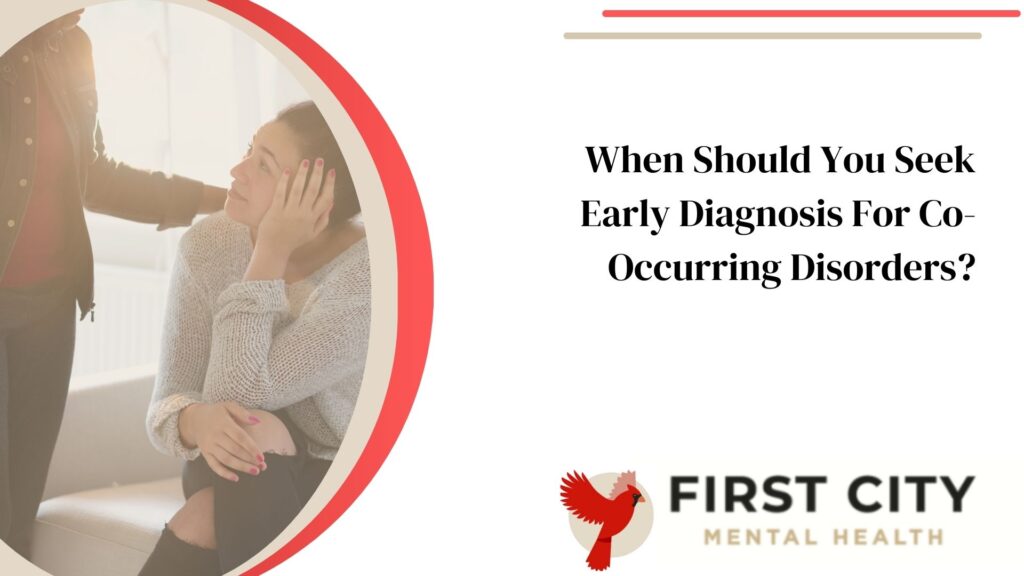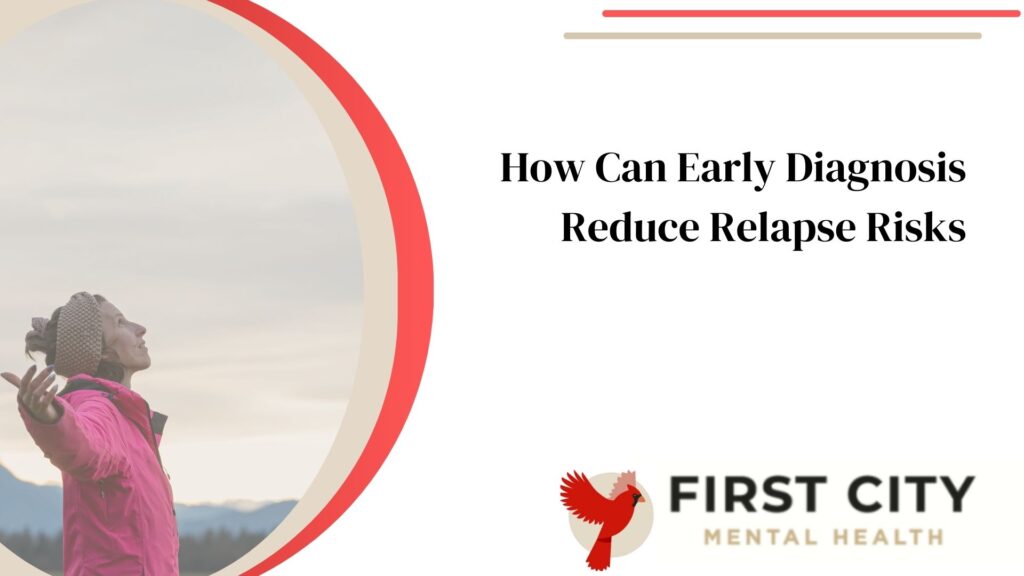
What Are Co-Occurring Disorders and How Are They Treated?
January 21, 2025
Why are Customizable Care Plans a Key Advantage of Partial Hospitalization Program?
January 22, 2025Effective management of co-occurring disorders treatment requires a nuanced approach, recognizing the intricate relationship between co-occurring mental disorders and substance use disorders. Early diagnosis plays a pivotal role in crafting a comprehensive treatment strategy, addressing both conditions simultaneously to enhance recovery outcomes.
This dual-focus approach alleviates symptoms and tackles the underlying causes, paving the way for a more sustainable healing process. Understanding the significance of timely and accurate diagnosis can transform the trajectory of treatment, offering individuals a more integrated and supportive path toward recovery.
Key Takeaways
- Early diagnosis of co-occurring disorders is crucial for improving treatment outcomes, as it allows for a more tailored and effective approach to dual recovery.
- Seeking early diagnosis can significantly prevent the worsening of conditions and reduce the risk of relapse by addressing both mental illness and substance use disorders simultaneously.
- It’s important to be vigilant about the first signs of co-occurring disorders, including significant changes in behavior, mood swings, and increased substance use, to seek timely help.
- Understanding why early diagnosis is vital can motivate individuals and their loved ones to prioritize early assessment and intervention, leading to better long-term recovery prospects.
Prevalence and Statistics
Co-occurring disorders are more common than many people realize. According to the Substance Abuse and Mental Health Services Administration (SAMHSA), approximately 8.2 million adults in the United States have co-occurring disorders, representing about 3.4% of the adult population. Research indicates that individuals with mental health conditions are more likely to develop substance use disorders and vice versa.
For example, people with depression are at a higher risk of developing a substance use disorder, while those with substance use disorders are more likely to experience depression. These statistics highlight the importance of early diagnosis and integrated treatment to address the complex needs of individuals with co-occurring disorders treatment Kokomo, Indiana.
What Is Early Diagnosis In Substance Use Disorder And Co-Occurring Disorders Treatment?
Early diagnosis in co-occurring disorders treatment is crucial. It refers to the identification of both mental health and substance use disorders as early as possible. This approach enables healthcare providers to create a comprehensive treatment plan. Such plans address both issues simultaneously, improving the chances of successful recovery.
In Kokomo, Indiana, professionals emphasize the importance of early diagnosis. They understand that individuals with co-occurring disorders face complex challenges. Without prompt and accurate diagnosis, their conditions could worsen, leading to more severe health complications.
Early diagnosis plays a pivotal role in preventing the escalation of these disorders. It involves thorough assessments and screenings conducted by qualified professionals. These experts are trained to recognize the signs of both mental health and substance abuse issues. Once identified, a tailored treatment strategy can be developed. This strategy often includes a combination of medication management, therapy, and support services.
The benefits of an early diagnosis are significant. It helps stabilize the patient’s condition and restore their quality of life. Patients receive the right support and resources to manage their symptoms effectively. Moreover, early intervention can significantly reduce co-occurring disorders’ social and economic impact on individuals and communities.
Why Does Early Diagnosis Improve Treatment Outcomes?
Early diagnosis plays a pivotal role in integrated treatment for co-occurring disorders. It sets the stage for a more effective intervention, significantly improving the chances of recovery. Identifying both mental disorders and substance use disorders early allows healthcare providers to design a comprehensive treatment plan. This plan addresses all aspects of an individual’s health.
When these conditions are diagnosed promptly, treatment can begin before the disorders become deeply entrenched. Early intervention prevents the complications that arise from long-term untreated disorders. These complications often make treatment more challenging and recovery less likely. By catching these issues early, individuals have a better chance at a full recovery because their bodies and minds have not been as severely impacted.
Moreover, early diagnosis fosters a better understanding of the relationship between mental health and substance abuse in an individual’s life. This insight is crucial for tailoring treatment approaches that tackle both conditions simultaneously. Customized treatment plans are more effective than addressing one disorder in isolation.
Furthermore, engaging individuals in treatment early often leads to greater compliance and participation. When they see progress and improvement, they are more likely to stay engaged with their treatment plans. This engagement is vital for long-term recovery and reduces the risk of relapse.
When Should You Seek Early Diagnosis For Co-Occurring Disorders?

Seeking an early diagnosis for treatment for co-occurring disorders is crucial. It should happen as soon as symptoms of either mental health issues or substance use disorders appear. Often, these conditions mask each other, making the diagnosis challenging. Early intervention, however, can significantly enhance the effectiveness of integrated treatment plans.
Individuals should consider an evaluation for co-occurring disorders if they notice persistent feelings of sadness or anxiety alongside an increase in substance use. Changes in behavior, such as withdrawing from social activities or declining performance at work or school, are also red flags. Family members and friends play a key role in identifying these signs and encouraging their loved ones to seek help.
The benefits of diagnosing co-occurring disorders early cannot be overstated. It allows healthcare providers to create a tailored integrated treatment plan that addresses both conditions simultaneously, which is more effective than treating one disorder at a time. Integrated treatment for co-occurring disorders combines psychiatric care with substance abuse treatment, offering a holistic path to recovery.
This proactive approach improves outcomes and enhances the quality of life for those with co-occurring disorders.
How Does Early Diagnosis Prevent Condition Worsening?
Early diagnosis plays a crucial role in managing co-occurring disorders. It allows for timely intervention, which can significantly prevent the conditions, including various mental illnesses, from worsening. When individuals receive an early diagnosis, healthcare providers can design a comprehensive treatment plan that addresses both mental health and substance use disorders simultaneously. This integrated approach is vital because it tackles the complexities of co-occurring disorders more effectively than treating each condition in isolation.
Moreover, early intervention helps reduce the risk of co-occurring disorders’ complications. These complications can include increased severity of symptoms, higher risk of hospitalization, and decreased quality of life. By identifying and treating co-occurring disorders early, individuals are less likely to experience these adverse outcomes. They have a better chance of recovery and maintaining long-term wellness.
Early diagnosis empowers individuals with knowledge about their condition. This understanding enables them to make informed decisions about their care. They learn coping strategies that help manage symptoms and reduce the likelihood of relapse. Education on the nature of their disorders and the importance of adherence to treatment plans becomes a cornerstone of successful management.
In essence, early diagnosis and subsequent co-occurring disorders treatment centers serve as a protective barrier against the escalation of these complex conditions. It ensures that individuals receive the right support at the right time, paving the way for a more hopeful and healthier future.
What Are The First Signs To Watch For Co-Occurring Disorders And Mental Health Conditions?

Identifying the first signs of adult co-occurring disorders treatment is crucial for timely intervention. These conditions often manifest through a combination of mental health and substance use symptoms, including drug abuse. Early detection can lead to more effective management, preventing the worsening of these conditions, as discussed in the previous section on early diagnosis.
One should be vigilant for signs such as sudden changes in behavior, including increased isolation or aggression. Unexplained physical symptoms, alongside mood swings, can also indicate the presence of co-occurring disorders. It’s important to note that these signs might not be specific to co-occurring disorders alone but are significant red flags that warrant further investigation.
Families and friends play a vital role in noticing these early warning signs. They are often the first to observe shifts in behavior, social withdrawal, or a decline in general well-being. Prompt action and seeking guidance from co-occurring disorders treatment centers can make a substantial difference in outcomes. These facilities specialize in addressing both the mental health and substance use aspects, offering integrated care that is essential for recovery.
In cases where substance use is evident, it’s critical to watch for an increase in usage or a reliance on substances to cope with daily stresses. Similarly, if mental health issues are present, a noticeable deterioration in functioning or an inability to manage routine tasks could signal the onset of a co-occurring disorder.
Treatment Options
Treatment for co-occurring disorders typically involves a combination of therapies and interventions. Integrated treatment, which coordinates substance abuse and mental health interventions, is often recommended by SAMHSA. This approach may include behavioral therapies such as cognitive-behavioral therapy (CBT) and dialectical behavior therapy (DBT), which help individuals develop coping skills and reduce maladaptive behaviors.
Additionally, treatment may involve collaboration between clinicians and organizations supporting housing, health, and employment. Psychoeducational classes can also play a vital role by increasing awareness of the symptoms of co-occurring disorders and the relationship between mental health conditions and substance abuse. By addressing both disorders simultaneously, integrated treatment offers a holistic path to recovery.
Barriers to Treatment
Despite the growing need for treatment, several barriers limit access to care for individuals with co-occurring disorders. Stigma remains a significant barrier, as individuals may fear seeking help due to concerns about societal judgment. Financial barriers also pose a challenge, as insurance companies may not cover the full cost of treatment. Access to care is particularly limited in rural areas, where specialized services may be scarce.
Additionally, managed care plans and primary care challenges can restrict the availability of comprehensive programs needed to address co-occurring disorders. Overcoming these barriers requires concerted efforts to increase awareness, reduce stigma, and expand access to affordable, integrated care.
Why Is Early Diagnosis Crucial For Dual Recovery?
Early diagnosis in treatment for co occurring disorders is a cornerstone for effective dual recovery. It sets the stage for tailored interventions that address both mental health and substance use issues concurrently, emphasizing the need to treat co occurring disorders for more effective outcomes. Identifying these disorders early can prevent the escalation of symptoms, reducing long-term complications.
The interplay between mental health disorders and substance abuse complicates diagnosis and treatment. However, when professionals identify co-occurring disorders early, it enables a more holistic approach to care. This approach considers all facets of an individual’s health, leading to better outcomes. Without early detection, treatments may only address one issue, worsening the other unnoticed.
Moreover, early diagnosis fosters a better understanding of the patient’s unique challenges. It allows for the development of a personalized treatment plan that meets their specific needs. Such plans often include a combination of therapy, medication management, and support services designed to promote dual recovery.
Furthermore, early intervention can significantly enhance quality of life. It helps individuals gain control over their symptoms faster, improving their ability to function in daily life. This improvement can lead to strengthened relationships, increased job stability, and decreased likelihood of legal issues related to substance use.
The Importance of Integrated Care
Integrated care is essential for the effective treatment of co-occurring disorders. By coordinating substance abuse and mental health interventions, integrated care helps individuals manage both conditions simultaneously. This approach can improve treatment outcomes, reduce relapse rates, and increase patient satisfaction. Integrated care often involves a team of healthcare professionals, including psychiatrists, psychologists, social workers, and addiction specialists.
By working together, these professionals can develop a comprehensive treatment plan that addresses both mental health and substance abuse issues. This collaborative approach ensures that individuals receive the support they need to achieve and maintain recovery, leading to a healthier and more fulfilling life.
Where To Get An Early Diagnosis For Co-Occurring Disorders?
Securing an early diagnosis for the treatment of co-occurring disorders is a crucial step toward recovery. Primary care physicians often serve as the first point of contact. They can recognize symptoms pointing to these disorders. Yet, they might not provide comprehensive treatment for co-occurring disorders. It’s essential to seek specialists who understand both mental health and substance use issues, considering genetic and environmental factors.
Mental health clinics offer more specialized care. They have teams experienced in diagnosing and treating co-occurring disorders. Such clinics use integrated approaches, combining therapy for mental health and substance abuse. This dual focus is vital for effective treatment.
Hospitals with psychiatric units are another option. They provide immediate assistance, especially in severe cases. Here, patients can receive an accurate diagnosis along with initial treatment plans. After stabilization, ongoing care usually shifts to outpatient settings.
Substance abuse treatment centers also play a significant role. Many have adapted to recognize and treat co-occurring mental health conditions. These centers provide a supportive environment where individuals can focus on recovery from both substance use and mental health challenges.
Community health centers offer another avenue for diagnosis and treatment. They provide services on a sliding income scale, making treatment more accessible to those in need.
For individuals unsure where to start, online resources and hotlines can guide them towards local services that specialize in co-occurring disorders treatment. Early intervention can significantly impact the success of dual recovery, making these resources invaluable.
How Can Early Diagnosis Reduce Relapse Risks

Early diagnosis plays a pivotal role in the treatment of co-occurring mental disorders. It sets the foundation for an effective treatment plan that addresses both mental health issues and substance use disorders simultaneously. Identifying these conditions early can significantly decrease the chances of relapse, as it allows healthcare providers to tailor a co-occurring disorders treatment program that meets the specific needs of the individual.
With an early diagnosis, individuals receive a comprehensive understanding of their conditions. This knowledge is crucial because it helps them recognize triggers and warning signs, enabling proactive management of symptoms. Moreover, early intervention facilitates the implementation of coping strategies that are vital for long-term recovery. These strategies include behavioral therapies, medication management, and support groups, all of which contribute to a more stable path toward recovery.
Furthermore, treating both conditions together from the start enhances the effectiveness of the treatment. It reduces the complexity that comes with untangling intertwined symptoms later on. Patients who understand their dual diagnosis are more likely to stay engaged in their treatment program, reducing the risk of relapse. They gain access to resources and support systems early on, which bolsters their resilience against future challenges.
Closing Thoughts
The importance of early diagnosis in co-occurring disorders treatment programs cannot be overstated. It is a critical factor that significantly enhances the chances of successful dual recovery, reduces the risk of relapse, and prevents worsening conditions. Early recognition of symptoms and prompt intervention pave the way for more effective, individualized treatment plans.
Encouraging individuals to seek early diagnosis and treatment for co-occurring disorders is essential. Awareness and education on the first signs to watch for can empower those affected and their loved ones to take action before conditions deteriorate. As society continues to destigmatize mental health and substance use disorders, it is hopeful that more individuals will feel supported in seeking help.
If anyone suspects they or someone they know may be experiencing co-occurring disorders, reaching out to a healthcare professional is a crucial step towards recovery. The journey to health begins with recognition and understanding, leading to a path of healing and resilience.
Frequently Asked Questions
What is Early Diagnosis in Co-occurring Disorders Treatment?
Early diagnosis refers to the timely identification of dual disorders, such as mental health issues alongside substance abuse, enabling prompt and effective treatment.
Why Does Early Diagnosis Improve Treatment Outcomes?
Early diagnosis allows for immediate intervention, preventing the disorders from worsening and improving the likelihood of successful recovery by addressing both substance use and mental illness comprehensively.
When Should You Seek early Diagnosis for Co-occurring Disorders?
Seek an early diagnosis when noticing initial signs of mental health issues or substance abuse, especially if they occur simultaneously.
How Does Early Diagnosis Prevent Condition Worsening?
By identifying and treating both conditions early, it halts their progression and mitigates potential complications, enhancing overall well-being.
What Are the First Signs to Watch for Co-occurring Disorders?
Initial signs include noticeable changes in behavior, mood swings, withdrawal from social activities, and increased substance use or reliance.






